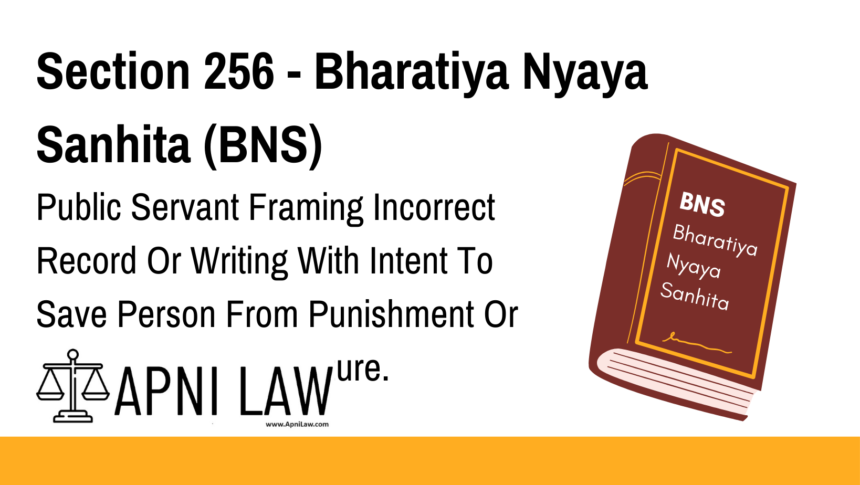Code: Section 256 BNS
Offence: Falsification of Records by a Public Servant
Whoever, being a public servant, and being as such public servant, charged
with the preparation of any record or other writing, frames that record or writing in a
manner which he knows to be incorrect, with intent to cause, or knowing it to be likely that
he will thereby cause, loss or injury to the public or to any person, or with intent thereby
to save, or knowing it to be likely that he will thereby save, any person from legal
punishment, or with intent to save, or knowing that he is likely thereby to save, any
property from forfeiture or other charge to which it is liable by law, shall be punished with
imprisonment of either description for a term which may extend to three years, or with fine,
or with both.
Explanation of Section 256 BNS
Section 256 of the BNSS deals with the criminal act of falsifying records or documents by a public servant. This section aims to prevent corruption, fraud, and misconduct in the preparation of official records. Key elements include:
- Public Servant: The offender must be a public servant who holds an official position requiring the preparation of records or documents.
- Incorrect Records: The offence involves knowingly creating false records or documents, whether intentionally altering existing data or fabricating new information.
- Intent or Knowledge: The act must be committed with:
- The intent to cause loss or injury to the public or an individual.
- The intent to save a person from legal punishment or reduce their liability.
- The intent to prevent property from being forfeited or charged under the law.
- Punishment:
- Imprisonment for up to three years (either rigorous or simple imprisonment).
- A fine, or both imprisonment and fine.
Illustration
Example 1: Falsifying Official Records
A government clerk intentionally alters financial records to hide embezzlement, knowing it will cause financial loss to the public. This act can lead to punishment under Section 256.
Example 2: Saving a Person from Legal Punishment
A police officer prepares a false investigation report to favor a person involved in a crime, intending to prevent the person from facing legal consequences. This constitutes an offence under this section.
Common Questions and Answers on Section 256 BNS
1. What constitutes an offence under Section 256 BNS?
- Answer: It involves a public servant knowingly framing incorrect records or documents with the intent to cause harm to the public, save someone from legal punishment, or prevent property from being forfeited.
2. What is the punishment for framing incorrect records under Section 256?
- Answer: The punishment can be imprisonment for up to three years, a fine, or both.
3. Does this section apply to all types of records?
- Answer: Yes, it applies to all official records, documents, reports, or writings prepared by public servants in the course of their duties.
Conclusion
Section 256 of the Bharatiya Nyaya Sanhita underscores the importance of integrity and honesty in public administration. It aims to deter public servants from manipulating records for personal gain or to obstruct justice, thereby promoting transparency and accountability in governance.











